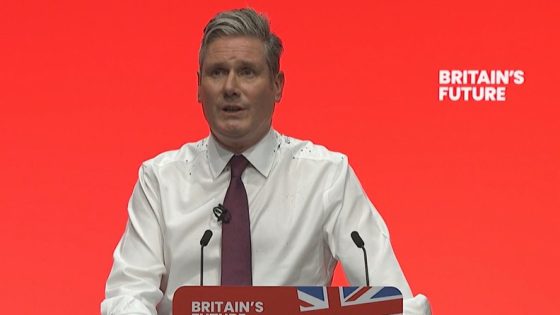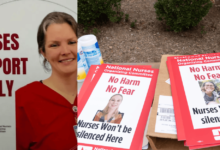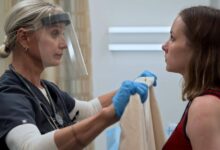Keir Starmer outlines priorities for NHS reform

A Labour government will “get the NHS working around the clock and pay staff properly to do it”, party leader Sir Keir Starmer has said today.
During his speech at the Labour Party conference, being held in Liverpool, Sir Keir outlined a series of commitments to reform the NHS if the party wins the next general election.
However, nurse leaders have urged the party to come up with “clear plans” to recruit and retain nursing staff, in order to tackle waiting lists and improve care.
“We must be the government that finally transforms our NHS”
Keir Starmer
It comes as, earlier this week, Labour pledged a £1.1bn package to cut NHS waiting lists in England by paying nurses and their colleagues to provide additional out-of-hours appointments.
In his speech today, Sir Keir gave an anecdote of a semi-professional footballer, who had to choose between paying £15,000 for an operation to fix his torn knee ligament, or “abandoning his career” because NHS waiting lists were so long.
In the end, he explained that the footballer had to crowdfund in order to have the procedure and continue playing.
Sir Keir said: “Honestly, how has it come to this?
“Working people paying for their own healthcare in a cost-of-living crisis [and] pensioners waiting weeks, months [and] sometimes waiting years just for the care they need.”
Currently, there are a record 7.7 million people in England waiting to start treatment on the NHS.
Sir Keir said that the fundamental principle of the NHS was “to be the crowdfunded solution for all of us”.
He added: “The next general election is on the line.
“The Conservative Party that brought our NHS to its knees will put it in the ground.
“We have got to get it back on its feet.”
The plan to cut waiting lists, unveiled by the Labour Party earlier this week, would see NHS staff being paid to take up additional overtime shifts on evenings and weekends so that more procedures can be carried out.
Sir Keir noted that the shifts would be funded by cancelling ‘non-dom’ tax status, which allows someone who was born in another country to pay tax in the UK only on their UK income.
He said: “We will invest that money in boosting capacity, we will get the NHS working around the clock and we will pay staff properly to do it.
“More operations, more appointments and more diagnostic tests.
“You will be seen more quickly in an NHS clearing the backlog seven days a week.”
However, the leader of the opposition warned that reform of the health service was unavoidable, arguing that, without it, the NHS would “remain on life support”.
“We must be the government that finally transforms our NHS,” said Sir Keir.
“We can’t go on like this, with a sickness service.
“We need an NHS that prevents illness, keeps people healthy and out of hospital in the first place.”
Labour has also unveiled a new fund which has promised to give the NHS state-of-the-art equipment and new technology in order to help cut waiting times.
Sir Keir said: “We must use technology to overhaul every aspect of delivery, move care closer to communities [and] deploy the power of artificial intelligence to spot disease quickly.”
Responding to the speech, the Royal College of Nursing’s chief nurse, Professor Nicola Ranger, said: “To end sticking plaster politics, Labour would need to invest in the nation’s most trusted profession and where they work.
“When one nurse is left looking after 10, 15 or more patients then governments need to act in the interests of patient and professional safety.
“They will need clear plans to recruit and retain more nursing staff to get waiting times down and improve care.
“This starts with paying nursing staff fairly and giving those we clapped a better pay award.”
Meanwhile, the chief executive of NHS Providers, Sir Julian Hartley, welcomed Labour’s proposals, but said it was “vital” to address the underlying issues facing health and care.
He said: “Waiting times were getting longer before the pandemic after years of underfunding and chronic staff shortages.
“Today there are 125,000 unfilled jobs across the NHS, leaving staff with heavy workloads and one in four absences due to anxiety, stress and depression.
“More national investment in public health and prevention, and in social care, is vital as well as substantially more capital spending to help ease pressure on stretched hospital, ambulance, mental health and community services and staff.”







